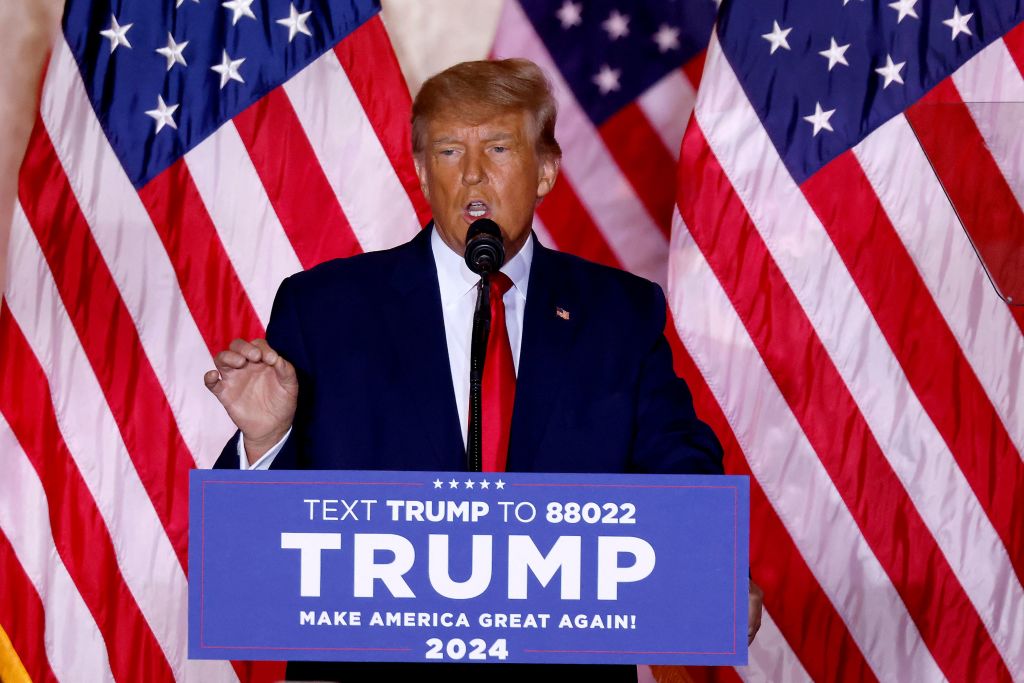Now that the midterms are behind us, I want to change things up a little bit for the holidays. Deeper dives, fewer plotlines. Let me know what you think in the comments section!
The Snack
The Georgia December 6 runoff is around the corner. But here’s some news I wasn’t expecting:
“Georgia voters set a single-day early turnout record Monday as over 301,500 people stormed to the polls on the first day they were open in most counties ahead of the U.S. Senate runoff,” wrote Mark Niesse in the Atlanta Journal-Constitution. “Turnout was even higher in the runoff Monday than it was during presidential elections, surpassing the previous high of 253,000 early voters on the Friday before Election Day in 2016.”
This doesn’t mean overall turnout will be that high. Perhaps people who used to vote on Election Day just want to get voting out of the way before they head to their Christmas parties. But it’s solid evidence that information about early voting is breaking through the noise—and as we’ve seen of late, early voters have been breaking for Democrats.
The Meal
There are a lot of “primaries” in a presidential cycle. There’s the donor primary and the buzz primary. Then there are things like the Iowa straw poll. And, eventually, there are actual election contests. My point is that there is a rhythm to these things.
The first thing that happens after a midterm is that presidential teams start drafting players. A serious candidate for president will already have a core team of two to five senior folks who have been with them for years, but that’s not enough to staff a presidential campaign. And normally that core team is missing some key positions, which is why they start looking at the waiver wire. In 2014, I worked at the Republican National Committee, which means I was one of those free agents. But most come from the top-tier Senate and governor campaign teams. I went on a few early dates in September and October of 2014 before going steady with the Carly Fiorina team in November.
For the next month, you’ll see little stories popping up in the places that operatives read. Here’s a good example from the inimitable Alex Isenstadt at Politico:
Former Vice President Mike Pence is building out his political staff, the latest indication that he’s prepping a White House bid that will pit him against his former boss, ex-President Donald Trump.
Ali Kjergaard, a spokesperson for outgoing Nebraska Sen. Ben Sasse, has been tapped to serve as communications director for Advancing American Freedom, a Pence-aligned non-profit organization that is serving as the former vice president’s campaign-in-waiting. Those familiar with the hiring process say two additional communications officials are expected to be added sometime early next year. Pence’s team is also looking to bring on fundraising aides. …
So far, the Pence operation totals around two dozen staff and consultants, a group that includes his former chief of staff, Marc Short, and former press secretary, Devin O’Malley, and a veteran GOP strategist, Chip Saltsman. All three are likely to play roles in a 2024 bid.
(Full disclosure: Devin was my deputy at the Justice Department and I worked with him on the Romney campaign in 2012. I will never be unbiased when it comes to Devin, but he also has no idea I’m using him as an example here.)
All of these stories will look something like the above: So-and-so already has two name-brands on board and the news hook is that they just brought on another starting player who just finished up working for someone you’ve heard of.
These stories don’t just happen. They are carefully crafted by the team to maximize the impact. It’s a small scoop, but political reporters still value them. So you want to give it to a reporter who will be a big player in the 2024 cycle and will appreciate the favor. Isenstadt: Check. You want to make sure the audience is other insiders, including other potential hires. Politico: Check. And you want to make sure it can break through—i.e., don’t do it in a super crowded news cycle. In and around holidays are best. Tuesday before Thanksgiving: Check.
In case you’re curious, here’s my 2014 version. (Note: It ran the day after New Year’s.)
The next big announcements usually come in the winter: the exploratory committees. The Federal Election Commission requires a presidential candidate to register with the FEC as a campaign committee and start filing reports once they raise or spend more than $5,000 toward their candidacy. From the FEC:
An individual who merely tests the waters, but not to campaign for office, does not have to register or report to the FEC. This is the case even if the funds raised and spent to test the waters exceed the $5,000 candidate registration threshold. … Once an individual begins to campaign or decides to become a candidate, the testing the waters period ends, and funds that were raised or spent to test the waters apply to the $5,000 threshold for qualifying as a candidate. After exceeding the threshold, the individual must register with the FEC as a candidate, designate and register a principal campaign committee, and begin to file reports.
But all of these guys are clearly running for president, right? So what’s the difference between testing the waters and an exploratory committee? It’s a little like Potter Stewart’s famous quote about pornography—“I know it when I see it”—but here’s some helpful tips. Polling is testing the waters. Telling the media you plan to announce for president is campaigning. Traveling to Iowa and New Hampshire repeatedly is testing the waters. Telling people to vote for you is campaigning.
Setting aside the legal niceties, it’s really just another chance to get some attention from reporters after the buzz dies down and when your 10th trip to Iowa isn’t getting the same juice for the squeeze.
But it also means that reporters are going to be able to track how much money you’re bringing in and how much you are spending. And that’s when the donor primary really starts to heat up. Don’t announce your exploratory committee until you have the infrastructure to get real money coming in and the relationships with big name donors to turn some heads. The biggest names among Republican donors can still only write the campaign a check for $2,900—but good reporters are scanning reports to see who has the support of the donors who can put $10 million-plus in a super PAC once things get rolling. Of course, sometimes a campaign may even tip off reporters who to look for.
After the exploratory committee phase comes the actual announcements. Like New Year’s Eve, these come with a lot of buildup and they rarely can live up to the hype. For the 2016 campaign, Ted Cruz jumped in first, announcing in March 2015. Scott Walker announced in July. In hindsight, Donald Trump was smart to come down the escalator to a few dozen paid actors in 2015, for no other reason than it didn’t matter. Carly announced May 4 on Good Morning America. There were stormtroopers all over the set. We hadn’t thought through the whole “May the Fourth be with you” thing when we found that date. But again, it didn’t much matter in the modern media age.
Then come the cattle calls. This is where three or more presidential candidates all speak seriatim to the same audience, usually—but not always—in one of the early states. Like any good livestock show and rodeo, it’s hard to judge the best steer unless you can line ‘em all up and really squeeze their haunches. I used to love these events. The candidates would all make awkward small talk while the staff stood around them like parents at a preschool birthday party.
“Aww did Marco get a haircut? It looks great.”
“Yes, but he only sat still because we promised him we’d stop at the Cinnabon afterward.”
“Scott Kevin Walker, you stop biting Chris this instant!”
“No, Ted. We share our cookies with Rand. Good job!”
In 2015, almost everyone in that staff circle had worked together on Romney’s 2012 campaign. We’d been on the same team just three years before. Imagine fighting shoulder-to-shoulder with a guy in the Mexican-American War only to run into him at Bull Run a few years later. You don’t agree with his choices of late, but you still have some good times to reminisce about.
Then there are the debates. Then Iowa. Then New Hampshire.
My point is this: Donald Trump may have already announced for president, but the race was well under way for any serious campaign already.
Announcing early certainly had some upsides for Trump. First, he could. He already had the fundraising infrastructure, as just one example, to ensure that the FEC reports wouldn’t be an embarrassment. He also set the pace. Anyone announcing now will be “challenging Trump for the Republican nomination.” And I’m sure his team was getting nervous that he’d violate the law by crossing that “testing the waters“ line either on accident or on purpose if they didn’t just let him say what he wanted to say.
It also had some obvious downsides. Now what? He doesn’t have a lot of arrows left in his quiver. Instead, all eyes are on the potential rivals with a lot of “will he/won’t he” (but mostly, “when will he”) talk around Ron DeSantis, Mike Pence, Glenn Youngkin, and Cruz.
Then, of course, there’s the Georgia runoff. Michael Bender at the New York Times just reported that “Donald J. Trump will not cross the Florida state line to campaign with Herschel Walker during the final week of the Georgia Senate runoff election, after both camps decided the former president’s appearance carried more political risks than rewards, campaign officials for the two Republicans said on Monday.”
If Republican primary voters’ biggest concern about Donald Trump is his viability in a general election after losses in 2018, 2020, and 2022, then another Republican loss in Georgia isn’t going to help. (As Bender notes, Trump “was the first Republican presidential candidate to lose the state in 28 years.”)
And this brings us to the one primary I didn’t talk about yet: the polls. Next week, I want to look at what polls this far out can tell us and what they’ve meant historically.









Please note that we at The Dispatch hold ourselves, our work, and our commenters to a higher standard than other places on the internet. We welcome comments that foster genuine debate or discussion—including comments critical of us or our work—but responses that include ad hominem attacks on fellow Dispatch members or are intended to stoke fear and anger may be moderated.
You are currently using a limited time guest pass and do not have access to commenting. Consider subscribing to join the conversation.
With your membership, you only have the ability to comment on The Morning Dispatch articles. Consider upgrading to join the conversation everywhere.